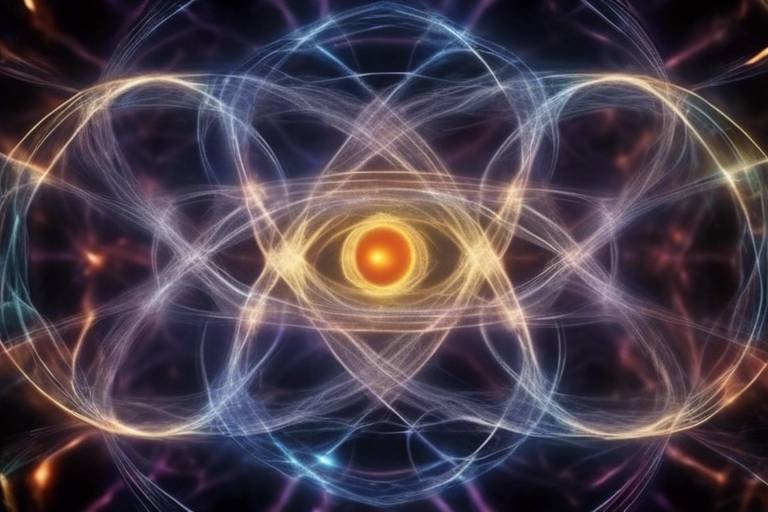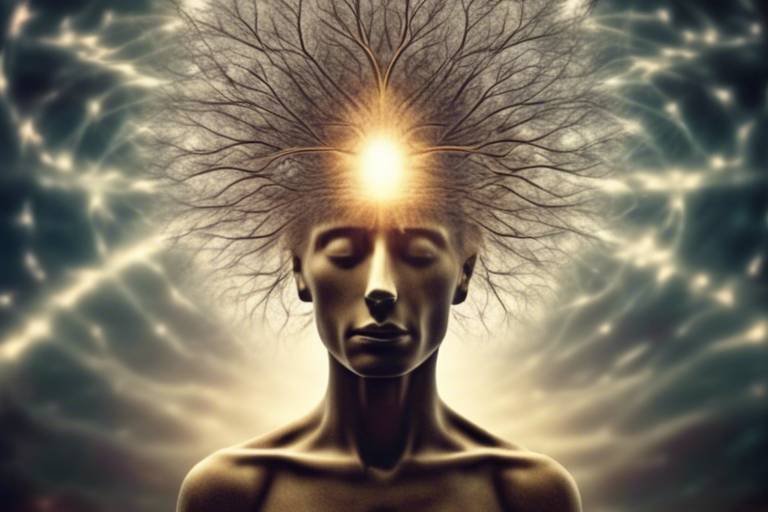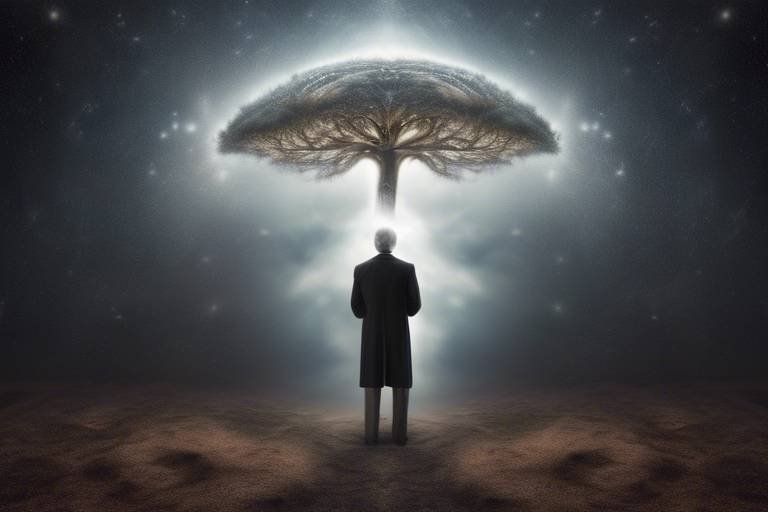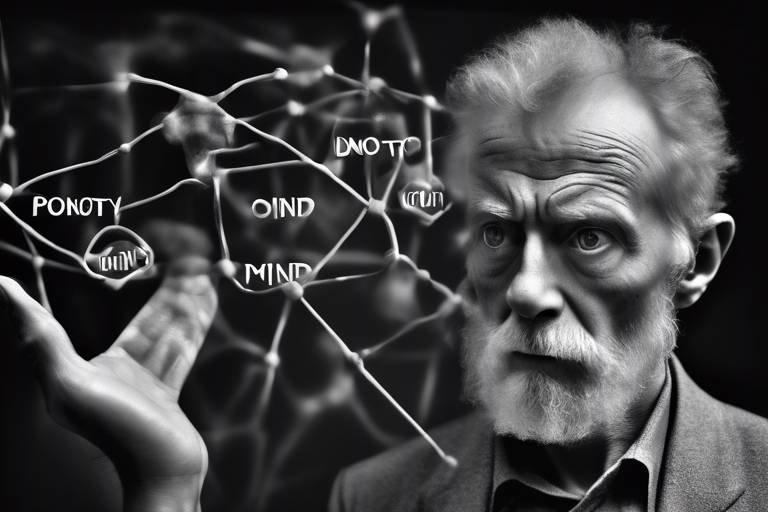Can Metaphysics Provide Answers to Life's Biggest Questions?
Have you ever found yourself staring at the night sky, pondering the mysteries of existence? You're not alone. Metaphysics is the branch of philosophy that dives deep into the profound questions that often keep us awake at night. It seeks to unravel the complexities of reality, existence, and the universe itself, providing us with insights that can illuminate our understanding of life's most significant dilemmas. But can metaphysics truly offer answers, or is it just a labyrinth of abstract ideas? Let’s embark on this intellectual journey together.
At its core, metaphysics asks questions that many of us grapple with: What is real? What does it mean to exist? And what is our purpose in this vast universe? These inquiries are not just academic; they resonate with our personal experiences and shape our worldview. Imagine metaphysics as a key that unlocks the door to deeper understanding, allowing us to peek behind the curtain of our everyday lives.
As we explore the realms of metaphysics, we discover that it's not merely about abstract theorizing. It's a rich tapestry woven from the threads of human thought, experience, and inquiry. From ancient philosophers like Aristotle and Plato to contemporary thinkers, metaphysics has evolved, yet its essence remains the same: to grapple with the fundamental nature of reality and existence.
So, can metaphysics provide answers to life's biggest questions? While it may not offer definitive solutions, it certainly encourages us to think critically and reflectively about our existence. It invites us to question the status quo and explore the depths of our beliefs and assumptions. In this article, we will delve into various facets of metaphysics, examining its implications on reality, existence, free will, and even the meaning of life itself.
Join me as we unpack these complex ideas, and perhaps, by the end, you might find that metaphysical inquiry not only enriches your understanding but also inspires a sense of wonder about the universe and our place within it.

The Nature of Reality
Understanding what constitutes reality is a central theme in metaphysics, and it’s something that has puzzled humanity for centuries. Imagine standing at the edge of a vast ocean, staring into the depths, wondering what lies beneath the surface. This analogy perfectly encapsulates our quest to grasp the essence of reality. Is reality merely what we can see and touch, or is there more to it than meets the eye?
At the heart of this exploration are two predominant philosophical views: materialism and idealism. Materialism posits that everything that exists is made up of matter, and thus, reality is fundamentally physical. On the other hand, idealism suggests that reality is mentally constructed, emphasizing that our perceptions shape our understanding of existence. This ongoing tug-of-war between these perspectives raises profound questions: If our thoughts shape reality, can we change our world simply by changing our mindset?
Moreover, the nature of existence itself is a pivotal aspect of this discourse. Think of existence as a grand tapestry woven with threads of experience, perception, and belief. Each thread represents an individual's unique perspective, contributing to a collective understanding of what is real. This metaphor highlights how subjective experiences can color our interpretation of reality.
In metaphysical discussions, we often encounter the idea of being and non-being. These concepts push us to consider the criteria that define existence. For instance, when we ask, “What does it mean to exist?”, we’re diving into a pool of philosophical inquiry that challenges our assumptions. Is existence merely about physical presence, or does it encompass experiences, emotions, and consciousness as well?
To further enrich our understanding, we can explore the relationship between substance and attribute. In metaphysics, a substance refers to entities that exist independently, while attributes are properties that describe these substances. For example, consider a tree: the tree itself is a substance, while its green leaves, height, and age are attributes. This distinction is crucial because it shapes our understanding of reality and existence. Are we merely collections of attributes, or do we possess an intrinsic substance that defines us?
In summary, the nature of reality is a complex and multifaceted topic that invites us to ponder fundamental questions about existence. As we navigate through these philosophical waters, it’s essential to remain open-minded and curious. After all, the journey to understand reality is as significant as the answers we seek.

The Concept of Existence
When we dive into the concept of existence, we’re embarking on a journey that challenges our fundamental understanding of what it means to be. Have you ever stopped to think about what it truly means to exist? Is it merely about being alive, or is there something deeper at play? Metaphysics, with its intricate web of ideas and theories, seeks to unravel these profound questions. It invites us to explore the essence of existence, probing into the realms of being and non-being, and examining the criteria that define our very presence in the universe.
At the heart of this exploration lies a critical inquiry: What constitutes existence? Is it the physical matter that we can touch and see, or is it something more abstract, like thoughts and emotions? To navigate through these questions, metaphysical thinkers often distinguish between different states of being. For instance, consider the difference between a rock and a thought. The rock is a tangible substance, while a thought is intangible yet undeniably real in its own right. This leads us to the fascinating distinction between substance and attribute.
In metaphysics, substance refers to entities that exist independently, such as objects and living beings. In contrast, attributes are the properties or characteristics that describe these substances. For example, the color red is an attribute of an apple, but the apple itself is the substance. This distinction not only shapes our understanding of existence but also influences our perceptions of reality. It compels us to ask: Are attributes merely descriptors, or do they play a role in the existence of substances? Can something exist without being perceived or defined by its attributes?
Furthermore, the exploration of existence leads us to ontology, a key branch of metaphysics focused on the study of being. Ontology delves into the categories of being and their interrelations, helping us comprehend the complex structure of reality. It raises intriguing questions like: What does it mean to be? Are there different levels or types of existence? For instance, can we consider dreams and ideas as existing in a meaningful way, even if they lack physical form?
Another captivating aspect of the concept of existence is how it intertwines with existentialism. This philosophical perspective emphasizes individual experience and choice, suggesting that our understanding of existence is profoundly shaped by our personal journeys. Think about it: each decision we make, each path we choose, contributes to our unique narrative of existence. In this light, existence isn't just about being; it's about becoming—a continuous process of growth and transformation.
As we ponder these questions, we realize that the concept of existence is not just an abstract philosophical debate; it has real-world implications. Our understanding of existence influences our values, our relationships, and even our sense of purpose. So, the next time you find yourself contemplating your place in the universe, remember that you are engaging with one of the most profound inquiries of metaphysics. It’s a journey filled with wonder, uncertainty, and the promise of discovery.
- What is the difference between being and existence?
Being refers to the state of existing, while existence encompasses the conditions and qualities that define what it means to be. - Can something exist without being perceived?
This is a debated topic in metaphysics, with some arguing that existence is independent of perception, while others believe perception plays a crucial role. - How does existentialism relate to the concept of existence?
Existentialism emphasizes individual experience and choice, suggesting that our understanding of existence is shaped by our personal journeys and decisions.

Ontology, a pivotal branch of metaphysics, dives deep into the very fabric of existence. It asks the fundamental question: what does it mean to "be"? This inquiry isn't just a philosophical exercise; it's the cornerstone of how we understand the world around us. Imagine standing in a vast library filled with books. Each book represents a different entity or concept, and ontology is the librarian helping us categorize and understand the relationships between these books. Through ontology, we explore two primary categories: substances and attributes.
Substances are the entities that exist independently; they are the "nouns" of our reality. Think of them as the actors on a stage, each one capable of existing on its own. On the other hand, attributes are the qualities or properties that describe these substances—like the colors, sizes, or shapes of the actors. They provide context and meaning but cannot exist without a substance to define them. For instance, a red apple is a substance, while "red" and "round" are attributes that describe that apple. This distinction helps us navigate the complexities of existence and provides clarity in our understanding of reality.
Moreover, ontology doesn't just stop at identifying substances and attributes; it also investigates their relationships. How do substances interact with one another? What happens when they change? These questions lead us to explore concepts like identity and change over time. For example, consider a tree. It may lose its leaves in the fall, yet it remains the same tree. This brings us to the philosophical debate surrounding persistence and identity—issues that ontology seeks to unravel.
In the realm of ontology, we also encounter various schools of thought that offer different perspectives on being. Some philosophers argue for a more materialistic view, positing that only physical entities truly exist, while others champion idealism, suggesting that reality is fundamentally mental or immaterial. These contrasting viewpoints create a rich tapestry of discourse, inviting us to ponder our place in the universe and the nature of our existence.
As we delve further into the study of being, we encounter existentialist perspectives that emphasize individual experience and choice. Existentialism posits that existence precedes essence, meaning that we first exist and then define our essence through our actions and choices. This viewpoint challenges the traditional ontological framework and encourages us to take responsibility for our existence, shaping our reality through our decisions.
In conclusion, ontology is not just an abstract concept; it is a vital lens through which we can explore the nature of being and existence. It prompts us to question our understanding of the world and our place within it, ultimately leading to profound insights about life itself. By engaging with ontology, we embark on a journey of discovery, grappling with the fundamental questions that define our reality.
- What is ontology? Ontology is the study of being and existence, exploring the categories of entities and their relationships.
- Why is ontology important? It helps us understand the fundamental nature of reality and our place within it.
- How does ontology relate to other branches of philosophy? Ontology intersects with metaphysics, epistemology, and existentialism, among others, providing a foundational framework for understanding various philosophical inquiries.
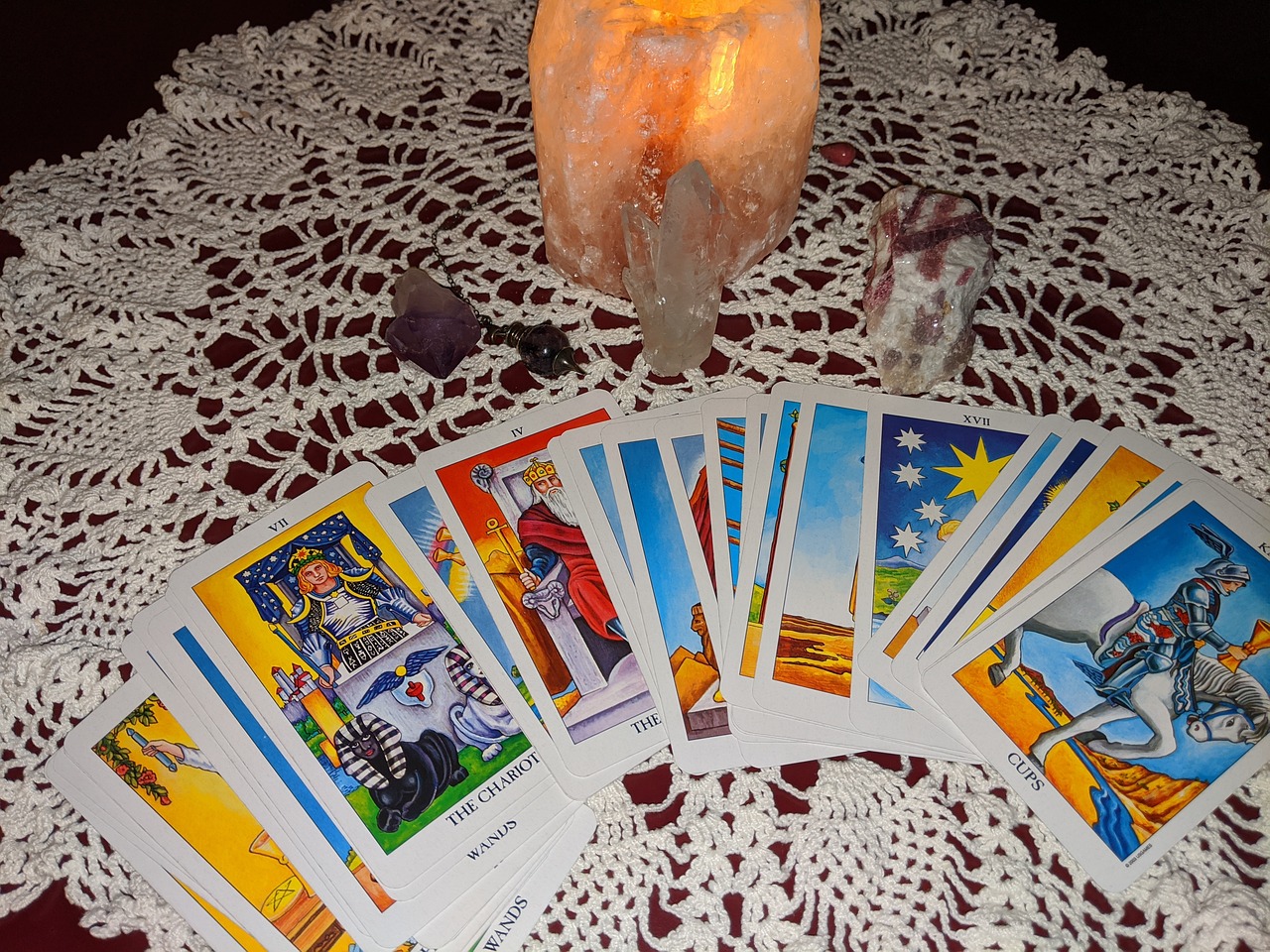
Substance vs. Attribute
When we dive into the realm of metaphysics, one of the most intriguing discussions revolves around the distinction between substances and attributes. At its core, this debate helps us understand how we perceive and categorize the world around us. Think of substances as the fundamental building blocks of reality—these are entities that exist independently, like a tree, a rock, or even a person. They possess a certain essence that remains constant, regardless of the changes they may undergo. For instance, a tree might lose its leaves in autumn, but it remains a tree, right?
On the other hand, attributes are the characteristics or properties that describe these substances. They can change over time and are often contingent upon the substances they describe. For example, the color of the tree's leaves can shift from green to vibrant red in the fall. This distinction is crucial because it shapes our understanding of existence itself. By recognizing the difference between what something is (substance) and the qualities it possesses (attributes), we can better grasp the complexities of reality.
To illustrate this further, consider the following table that summarizes the key differences between substances and attributes:
| Aspect | Substance | Attribute |
|---|---|---|
| Definition | Entities that exist independently | Properties that describe substances |
| Changeability | Generally constant | Can change over time |
| Examples | A tree, a person | Color, size, shape |
Understanding this distinction also leads us to explore deeper philosophical questions. For instance, if we consider the nature of a person, we might ask: What truly defines an individual? Is it their physical body (substance), or is it their personality traits and experiences (attributes)? This question opens up a Pandora's box of existential musings. It forces us to confront the very essence of what it means to be human.
Moreover, the interplay between substance and attribute can be seen in various philosophical traditions. For example, in Aristotelian philosophy, substances are seen as primary beings, while attributes are secondary. This relationship is not just academic; it has real-world implications in how we perceive identity, change, and continuity in our lives.
As we navigate through life, the distinction between substances and attributes can help us make sense of our experiences. It encourages us to look beyond the surface and understand the underlying realities that shape our existence. So, the next time you ponder the nature of reality, remember this vital distinction—it might just provide you with the insights you need to unravel the mysteries of life.
- What is the difference between substance and attribute?
Substance refers to the independent entities that exist, while attributes are the properties that describe those substances. - Can attributes change while substances remain the same?
Yes, attributes can change over time, while substances maintain their identity. - Why is understanding this distinction important?
It helps us comprehend the complexities of existence and the nature of reality.

Existentialism and Being
When we dive into the realm of existentialism, we find ourselves grappling with the very essence of being. This philosophical movement, which gained traction in the 20th century, emphasizes individual experience and the inherent freedom that comes with it. Think of it as a spotlight shining on the human condition, illuminating how we navigate our existence in a world that often feels chaotic and indifferent. Existentialists argue that existence precedes essence, meaning that we are not born with a predetermined purpose but rather, we create our own meaning through the choices we make. This perspective invites us to ponder: if we are the architects of our lives, what does that say about the nature of reality itself?
At the heart of existentialism lies the idea that our choices define us. Imagine standing at a crossroads in life, with countless paths stretching before you. Each decision you make not only shapes your future but also contributes to your identity. This notion challenges the traditional views of metaphysics, which often seek to categorize existence in a more rigid way. Instead, existentialism embraces the fluidity of being, suggesting that our understanding of reality is as dynamic as our experiences.
Moreover, existentialism highlights the struggle against absurdity. Life can sometimes feel like a series of random events, devoid of meaning. This struggle is beautifully captured in the works of philosophers such as Jean-Paul Sartre and Albert Camus, who explored how individuals confront the absurdity of existence. For instance, Camus famously used the metaphor of Sisyphus, a figure condemned to roll a boulder up a hill only for it to roll back down, to illustrate the human condition. Yet, he concluded that one must imagine Sisyphus happy, suggesting that finding joy in our struggles is part of what it means to be human.
Existentialism also raises profound questions about authenticity and the self. In a world filled with societal pressures and expectations, how do we remain true to ourselves? This quest for authenticity can be both liberating and daunting. It requires introspection and a willingness to confront uncomfortable truths about our desires, fears, and motivations. As we navigate this journey, we may find ourselves asking: Are we living for ourselves, or are we merely fulfilling the roles assigned to us by others?
Ultimately, existentialism invites us to embrace our freedom and the responsibility that comes with it. It challenges us to live deliberately and to make choices that resonate with our true selves. This philosophical approach not only enriches our understanding of being but also encourages us to engage with the world around us in a more meaningful way. In a sense, existentialism acts as a compass, guiding us through the complexities of existence and helping us forge our paths in a universe that often feels uncertain.
- What is existentialism? Existentialism is a philosophical movement that emphasizes individual existence, freedom, and choice, asserting that individuals create their own meaning in life.
- Who are some key figures in existentialism? Notable existentialist thinkers include Jean-Paul Sartre, Simone de Beauvoir, Albert Camus, and Martin Heidegger.
- How does existentialism differ from traditional metaphysics? While traditional metaphysics often categorizes existence in a rigid manner, existentialism focuses on personal experience and the fluidity of being.
- What does it mean to live authentically? Living authentically means being true to oneself, making choices based on personal values rather than societal expectations.

Cosmology: The Nature of the Universe
When we dive into the vast ocean of cosmology, we are not just skimming the surface; we are exploring the depths of existence itself. Cosmology is the branch of metaphysics that seeks to unravel the mysteries surrounding the universe's origins, its intricate structure, and its ultimate fate. Imagine standing on a beach, gazing at the horizon; that endless expanse of water symbolizes the universe, and each wave that crashes represents the myriad questions we have about it. Where did it all begin? What is its purpose? Will it ever come to an end? These questions are not merely academic; they resonate with our very being.
At the heart of cosmology lies the concept of the Big Bang, a theory that posits the universe began approximately 13.8 billion years ago from an infinitely dense point. This explosion of energy and matter set the stage for everything we see today. But what came before the Big Bang? Was there a time when nothing existed? These inquiries lead us to ponder the nature of time and space themselves, challenging our understanding of reality. Are time and space merely constructs of our perception, or do they have an objective existence independent of our consciousness?
As we delve deeper into cosmological studies, we encounter various theories about the universe's structure. For instance, the multiverse theory suggests that our universe is just one of many, each with its own laws of physics and realities. This idea is mind-boggling and expands our understanding of existence beyond the confines of a single universe. Consider the implications: if countless universes exist, what does that mean for our understanding of life, destiny, and even free will? Are we merely a tiny speck in a vast cosmic sea?
Moreover, cosmology doesn't just focus on the past; it also speculates about the future of the universe. Will it continue to expand indefinitely, or will gravity eventually pull everything back together in a Big Crunch? Alternatively, could it reach a state of equilibrium, leading to a Big Freeze? Each of these scenarios presents unique philosophical implications about our place in the cosmos and the significance of our existence.
To better understand these complex ideas, we can summarize some key concepts in a table:
| Theory | Description |
|---|---|
| Big Bang | The universe originated from a singularity, expanding over billions of years. |
| Multiverse | Our universe is one of many, each potentially with different laws of physics. |
| Big Crunch | The universe may eventually collapse back into a singular point. |
| Big Freeze | The universe will continue to expand until it reaches a state of maximum entropy. |
Ultimately, cosmology invites us to ponder profound questions about our existence. It challenges us to consider not just where we come from, but also where we are going. Each discovery in this field is like a new star appearing in the night sky, illuminating the darkness of our ignorance. As we explore these cosmic mysteries, we are reminded of our smallness in the grand scheme of things, yet we also recognize the immense significance of our quest for understanding. In the end, cosmology is not just about the universe; it’s about us, our place in it, and the questions that drive us to seek answers.
- What is cosmology? Cosmology is the scientific study of the large-scale properties of the universe as a whole, including its origins, evolution, and eventual fate.
- What is the Big Bang theory? The Big Bang theory is the leading explanation for the origin of the universe, suggesting it began from an extremely hot and dense state and has been expanding ever since.
- What is the multiverse theory? The multiverse theory posits that our universe is just one of many universes that exist, each with its own distinct properties and laws of physics.
- What will happen to the universe in the future? The future of the universe is still a topic of research, with theories suggesting it could either continue to expand indefinitely or eventually collapse back into a singularity.

The Problem of Free Will
The concept of free will has been a hot topic in philosophical discussions for centuries, igniting debates that often feel like a tug-of-war between two opposing forces: determinism and libertarianism. At its core, the question is simple yet profound: do we truly have control over our actions, or are we merely puppets dancing to the strings of fate? This dilemma isn't just an academic exercise; it resonates deeply with our everyday experiences. Imagine you're at a crossroads, literally or metaphorically, and you have to make a choice. Do you feel that this decision is entirely yours, or do you sense that external forces are nudging you in one direction or another?
Determinism posits that every event, including human actions, is determined by preceding events in accordance with the natural laws. In this view, the universe is like a giant clockwork mechanism, where every tick is predetermined by the last. On the flip side, libertarianism argues for the existence of free will, suggesting that individuals have the capacity to make choices that are not preordained. This perspective paints a more colorful picture of human agency, where we are the artists of our own destinies, wielding brushes of choice and consequence.
But what implications does this debate have for our understanding of morality? If determinism is true, can we hold individuals accountable for their actions? After all, if every decision is the result of prior causes beyond our control, what does that say about our justice system? Conversely, if we embrace libertarianism, we must grapple with the weight of responsibility that comes with the freedom to choose. It's like walking a tightrope—balancing the freedom to act with the consequences of those actions.
Consider the following table that summarizes the two perspectives:
| Aspect | Determinism | Libertarianism |
|---|---|---|
| Definition | All events are determined by preceding events | Individuals can make choices independent of prior causes |
| Accountability | Questionable; actions are preordained | Strong; individuals are responsible for their choices |
| Implications for Morality | Challenges traditional views of justice | Supports the idea of moral responsibility |
As we explore these intricate ideas, it becomes clear that the problem of free will is not merely a philosophical debate; it's a fundamental aspect of what it means to be human. The choices we make shape our identities, influence our relationships, and ultimately define our existence. So, the next time you find yourself at a crossroads, take a moment to ponder: are you the master of your fate, or is fate the master of you?
- What is free will? Free will is the ability to choose one's actions and make decisions independently of any predetermined fate.
- What is determinism? Determinism is the philosophical belief that all events, including human actions, are determined by previously existing causes.
- How does free will relate to morality? The debate over free will impacts our understanding of moral responsibility, as it questions whether individuals can be held accountable for their actions.
- Can free will and determinism coexist? Some philosophers argue for compatibilism, suggesting that free will can exist even within a deterministic framework.

Determinism vs. Libertarianism
When we dive into the philosophical waters of determinism and libertarianism, we find ourselves grappling with one of the most profound questions of human existence: Do we truly have control over our actions? Determinism posits that every event, including human actions, is the result of preceding events in accordance with the laws of nature. In simpler terms, it suggests that everything is preordained, like a well-rehearsed play where every actor knows their lines and movements before stepping onto the stage. This perspective can feel quite constraining, as it implies that our choices may not be as free as we like to believe.
On the other hand, libertarianism offers a refreshing counterpoint, advocating for the existence of free will. Libertarians argue that humans possess the ability to make genuine choices that are not entirely dictated by prior causes. Imagine standing at a crossroads; one path leads to a familiar destination, while the other is shrouded in mystery. Libertarianism tells us that we have the freedom to choose either path, and that choice is a reflection of our autonomy and moral responsibility.
To illustrate the contrast between these two perspectives, consider the following table:
| Aspect | Determinism | Libertarianism |
|---|---|---|
| Nature of Choices | Pre-determined by past events | Genuinely free and self-determined |
| Moral Responsibility | Limited; actions are consequences of prior causes | Full; individuals are accountable for their choices |
| Philosophical Basis | Scientific determinism, natural laws | Existentialism, personal agency |
The implications of these two viewpoints extend into our understanding of morality and ethics. If determinism holds true, can we truly blame someone for their actions if they were simply following a predetermined script? Conversely, if we embrace libertarianism, we must grapple with the weight of our decisions and the moral implications they carry. This debate has significant consequences, influencing not just philosophical discourse but also our legal systems, societal norms, and personal relationships.
Ultimately, the clash between determinism and libertarianism invites us to reflect on our own lives. Are we mere puppets dancing to the strings of fate, or are we the masters of our own destinies? As we ponder these questions, we may find that the truth lies somewhere in between, encouraging a deeper exploration of what it truly means to be human.
- What is determinism? Determinism is the philosophical belief that all events, including human actions, are determined by preceding events in accordance with natural laws.
- What is libertarianism in philosophy? Libertarianism asserts that humans have free will and can make choices independent of external influences or preordained events.
- How do determinism and libertarianism impact moral responsibility? Determinism suggests limited moral responsibility since actions are seen as consequences of prior causes, while libertarianism emphasizes full accountability for one's choices.

Implications for Morality
The intersection of free will and morality is a captivating area of metaphysical inquiry that challenges our understanding of ethics and accountability. When we ponder whether our actions are genuinely our own or merely the result of predetermined events, we encounter a profound dilemma that influences how we perceive moral responsibility. If we are merely puppets in a cosmic play, can we truly be held accountable for our actions? This question leads us down a rabbit hole of philosophical exploration, as we examine the implications of both determinism and libertarianism on our moral frameworks.
In a deterministic view, where every action is the result of preceding events, the concept of moral responsibility becomes murky. If our choices are dictated by a chain of prior occurrences—be they biological, environmental, or social—then how can we justly assign blame or praise? Consider a scenario where an individual commits a crime due to a long history of abuse and neglect. A deterministic perspective might suggest that this person was bound by their circumstances, leading us to question whether punishment serves any real purpose. Is it fair to punish someone for actions that were ultimately out of their control? This brings us to a critical examination of justice systems globally, as they grapple with the balance between accountability and compassion.
On the flip side, the libertarian stance posits that individuals possess the ability to make choices independent of prior causes. This belief empowers the notion of moral responsibility, as it asserts that we are the architects of our actions. In this light, ethical frameworks often hinge on the idea of free will, suggesting that individuals can choose to act morally or immorally. This perspective fuels debates about the nature of punishment and reward, as it emphasizes the importance of intention behind actions. For instance, if someone chooses to act altruistically, their moral standing is elevated, reinforcing the idea that we are responsible for our choices. However, this perspective also raises questions about the nature of moral failure. If someone chooses to act immorally, can they be redeemed? And what does redemption look like in a world where free will reigns supreme?
Moreover, the implications of free will on morality extend into societal norms and laws. If we accept that individuals have the power to choose, then our legal systems must reflect this belief. Laws are often designed to deter immoral behavior by imposing consequences for actions deemed unacceptable. Yet, if we lean toward a deterministic view, we may find ourselves advocating for rehabilitation over punishment, recognizing that individuals are products of their circumstances. This tension between punishment and rehabilitation is at the heart of many contemporary debates about criminal justice reform.
Ultimately, the implications for morality are complex and multifaceted. They challenge us to reconsider our beliefs about human nature and the very foundations of ethical behavior. As we navigate these philosophical waters, it becomes increasingly important to foster dialogues that integrate both perspectives, recognizing that perhaps our understanding of morality is not a binary choice between free will and determinism but rather a nuanced tapestry woven from both threads. This ongoing exploration invites us to reflect on our values, the nature of our choices, and how we hold ourselves and others accountable in a world filled with uncertainty.
- What is the difference between determinism and libertarianism? Determinism suggests that all events, including human actions, are determined by preceding events, while libertarianism advocates for free will and the ability to make independent choices.
- How does free will impact moral responsibility? If we have free will, we can be held accountable for our actions; if we are determined by prior causes, moral responsibility becomes more complex.
- Can a deterministic view support rehabilitation in the justice system? Yes, a deterministic perspective may lead to advocating for rehabilitation rather than punishment, as it recognizes that individuals are shaped by their circumstances.
- Is it possible to reconcile free will and determinism? Many philosophers argue that a nuanced understanding of both can provide a more comprehensive view of morality, suggesting that our choices are influenced but not entirely dictated by external factors.

The Meaning of Life
When we dive into the question of , it often feels like we're standing at the edge of a vast ocean, peering into the depths of existence. This inquiry has puzzled philosophers, theologians, and everyday people for centuries. What is our purpose? Are we here by chance, or is there a grand design? These questions resonate deeply within us, prompting a myriad of interpretations and insights.
Metaphysical inquiries about life's purpose lead us down various paths, each offering unique perspectives. For some, the search for meaning is a personal journey, shaped by individual experiences and choices. For others, it is rooted in collective beliefs, traditions, and the cultural narratives we inherit. Existentialism, for instance, posits that individuals must create their own meaning in a seemingly indifferent universe, while nihilism suggests that life is inherently meaningless, challenging us to confront the void.
In exploring these philosophical perspectives, we can categorize them into a few key viewpoints:
- Existentialism: This philosophy emphasizes personal responsibility and the freedom to define one’s own meaning in life.
- Nihilism: Nihilists argue that life lacks inherent value or meaning, leading to a sense of despair or liberation, depending on one’s perspective.
- Absurdism: Absurdists, like Albert Camus, suggest that while life may be devoid of meaning, we can still find joy in the struggle and the experience of living.
On the other hand, many spiritual and religious traditions offer rich insights into the meaning of life. These beliefs often provide a framework for understanding our existence and our place in the universe. For example:
- Christianity: Life's purpose is often seen as serving God and others, with the ultimate goal of eternal life.
- Buddhism: The meaning of life revolves around the pursuit of enlightenment and the alleviation of suffering.
- Hinduism: Life is viewed as a journey through cycles of rebirth, with the ultimate aim of achieving moksha, or liberation from the cycle of life and death.
These diverse beliefs highlight how cultural and spiritual contexts shape our understanding of life’s meaning. Whether through philosophical inquiry or religious faith, the quest for purpose is a deeply human endeavor. It invites us to reflect on our values, our relationships, and our impact on the world around us. Ultimately, the meaning of life may not be a definitive answer but rather a journey of exploration and discovery, where the questions we ask are just as important as the answers we seek.
Q: Is there a universal meaning of life?
A: While many seek a universal answer, the meaning of life is often subjective, shaped by individual beliefs, experiences, and cultural backgrounds.
Q: How can I find my personal meaning in life?
A: Reflecting on your passions, values, and relationships can help you uncover what gives your life meaning. Engaging in activities that resonate with you can also provide insights.
Q: Do religious beliefs influence the meaning of life?
A: Yes, religious beliefs often provide frameworks and narratives that help individuals understand their purpose and role in the universe.
Q: Can life be meaningful without a belief in a higher power?
A: Absolutely! Many find meaning through personal experiences, relationships, and contributions to society, independent of religious beliefs.

Philosophical Perspectives
When it comes to the meaning of life, philosophical perspectives offer a rich tapestry of insights that can illuminate our understanding of existence. Think of philosophy as a vast ocean, with each school of thought representing a different wave, crashing against the shores of our consciousness. From existentialism to nihilism, these perspectives challenge us to reflect deeply on our roles in the universe.
Existentialists, for instance, argue that life is inherently devoid of meaning, and it is up to each individual to create their own purpose. This perspective can be both liberating and daunting. Imagine standing on the edge of a cliff, looking out at a vast expanse of possibilities. You have the freedom to choose your path, but with that freedom comes the weight of responsibility. The existentialist view encourages us to embrace our freedom and craft our own narratives, even in the face of an indifferent universe.
On the other hand, we have nihilism, which posits that life is ultimately meaningless. This perspective can feel like a dark cloud hovering over our existence, leading some to despair. However, nihilism also invites a sense of liberation; if life lacks inherent meaning, we are free to create our own values and live authentically. It’s akin to being handed a blank canvas—while it may seem overwhelming at first, it also opens the door to endless creative possibilities.
Another fascinating perspective comes from the realm of utilitarianism, which suggests that the meaning of life can be found in the pursuit of happiness and the reduction of suffering. This approach encourages us to consider the impact of our actions on the greater good, urging us to cultivate compassion and empathy. Imagine a world where our choices are guided by the desire to uplift others; this perspective can transform our understanding of purpose into one rooted in connection and community.
Additionally, the philosophical lens of stoicism teaches us that meaning can be derived from how we respond to life's challenges. Stoics advocate for resilience and virtue, suggesting that our character and actions define our purpose rather than external circumstances. Picture a sturdy tree weathering a storm; it’s not the storm that defines its strength but its ability to stand tall despite the tempest. This perspective encourages us to focus on our responses, nurturing inner strength and wisdom.
As we explore these diverse philosophical perspectives, it's essential to recognize that they are not mutually exclusive. Each offers unique insights that can be woven together to form a more comprehensive understanding of life's meaning. Just like a rich tapestry, the threads of existentialism, nihilism, utilitarianism, and stoicism can intertwine to create a vivid picture of our existence.
In conclusion, the philosophical perspectives on the meaning of life remind us that we are active participants in our own narratives. Whether we find meaning through individual creation, the pursuit of happiness, resilience, or a combination of these elements, the journey of exploration is what makes life truly profound. So, what will you choose to create in your own life story?
- What is the main idea of existentialism? Existentialism emphasizes individual freedom and choice, suggesting that people must create their own meaning in an inherently meaningless world.
- How does nihilism differ from existentialism? While existentialism encourages the creation of personal meaning, nihilism posits that life is ultimately meaningless, which can lead to despair or liberation.
- What role does utilitarianism play in finding meaning? Utilitarianism focuses on maximizing happiness and reducing suffering, suggesting that our purpose can be found in contributing to the greater good.
- Can stoicism help in understanding life's meaning? Yes, stoicism teaches that meaning comes from how we respond to challenges, emphasizing virtue and resilience in the face of adversity.

Spiritual and Religious Insights
When we delve into the realm of spirituality and religion, we uncover a rich tapestry of beliefs that seek to answer the profound question of life's meaning. Across cultures and ages, humans have turned to spiritual practices and religious teachings to find a sense of purpose and connection to something greater than themselves. This quest often leads to a variety of interpretations, each offering unique insights into the nature of existence.
Many spiritual traditions posit that life is a journey toward enlightenment or self-realization. For instance, in Buddhism, the concept of samsara (the cycle of birth, death, and rebirth) emphasizes that our actions (karma) shape our future experiences. This perspective encourages individuals to cultivate mindfulness and compassion, suggesting that the essence of life lies in our interactions with others and our personal growth.
On the other hand, monotheistic religions like Christianity, Islam, and Judaism often present a more linear understanding of existence. These faiths typically assert that life is a gift from a divine creator, with a clear purpose outlined through sacred texts. For example, in Christianity, believers are called to love and serve others, reflecting the teachings of Jesus Christ. This sense of duty and connection to a higher power provides many adherents with a framework through which they interpret their lives.
Interestingly, some religious philosophies blend the spiritual and the existential, offering a more holistic view. For instance, Hinduism introduces the concept of dharma, which refers to one's duty or righteousness in life. It suggests that by fulfilling one's dharma, individuals contribute to the cosmic order and find personal fulfillment. This intertwining of personal responsibility and universal harmony illustrates how spiritual insights can shape our understanding of existence.
Moreover, many indigenous beliefs emphasize a deep connection to nature and the universe. These traditions often view life as a sacred cycle, where every being is interrelated. This perspective invites individuals to respect the environment and recognize their role within the broader ecosystem, providing a sense of belonging and purpose.
Ultimately, the insights gained from spiritual and religious traditions serve as guiding lights in our search for meaning. They encourage introspection, foster community, and inspire individuals to ponder their place in the universe. Whether through the lens of organized religion or personal spirituality, these teachings remind us that the quest for understanding is as essential as the answers we seek.
- What is the main purpose of spiritual beliefs?
The main purpose of spiritual beliefs is to provide individuals with a sense of meaning, connection, and purpose in life. They often guide moral decisions and foster a sense of community.
- How do different religions view the meaning of life?
Different religions offer various interpretations of life's meaning, often based on their teachings, sacred texts, and cultural contexts. For example, some may focus on serving others, while others emphasize personal growth and enlightenment.
- Can spirituality exist without religion?
Yes, spirituality can exist independently of organized religion. Many people identify as spiritual but not religious, seeking personal meaning and connection outside traditional religious frameworks.
Frequently Asked Questions
- What is metaphysics?
Metaphysics is a branch of philosophy that explores the fundamental nature of reality, existence, and the universe. It dives deep into questions about what things are, how they exist, and the relationships between different entities.
- How does metaphysics differ from other branches of philosophy?
While other branches of philosophy focus on ethics, politics, or aesthetics, metaphysics specifically examines the nature of reality and existence itself. It's like the foundation of a house; without understanding the ground it stands on, you can't build anything meaningful on top.
- What are some key concepts in metaphysics?
Some key concepts include ontology (the study of being), cosmology (the study of the universe), and the nature of free will. These concepts help us navigate complex questions about our existence and the universe around us.
- What is ontology?
Ontology is the study of being and existence. It investigates what it means for something to exist and categorizes different types of entities. Think of it as a way to map out the various forms of existence in our reality.
- How does metaphysics address the concept of free will?
Metaphysics examines the debate between determinism (the idea that all events are predetermined) and libertarianism (the belief in free will). This discussion raises questions about whether we truly have control over our actions or if everything is set in motion by prior causes.
- What are the implications of free will on morality?
The concepts of free will and determinism have significant implications for morality. If we have free will, we are accountable for our choices. However, if determinism is true, it challenges the notion of moral responsibility, leading to profound ethical questions.
- What is the meaning of life according to metaphysics?
Metaphysical inquiries often lead to questions about life's purpose and meaning. Different philosophical perspectives, such as existentialism and nihilism, offer various interpretations, each providing unique insights into our existence and roles in the universe.
- How do spiritual and religious traditions view the meaning of life?
Spiritual and religious traditions offer diverse beliefs and practices that seek to provide answers to the meaning of life. These perspectives can range from seeking unity with a higher power to understanding one's place in the cosmos, enriching our understanding of existence.


